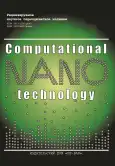A Refined Method for Analytical Modeling of the Processes of Spreading Virus Software to Assess the Security of Informatization Objects
- Authors: Zavodtsev I.V.1, Borisov M.A.1, Bondarenko N.N.1, Meleshko V.A.1
-
Affiliations:
- Lomonosov Moscow State University
- Issue: Vol 9, No 1 (2022)
- Pages: 11-20
- Section: Articles
- URL: https://journals.rcsi.science/2313-223X/article/view/147102
- DOI: https://doi.org/10.33693/2313-223X-2022-9-1-11-20
- ID: 147102
Cite item
Abstract
Full Text
##article.viewOnOriginalSite##About the authors
Ilia V. Zavodtsev
Lomonosov Moscow State University
Email: nilrs@rambler.ru
Cand. Sci. (Eng.), Associate Professor Moscow, Russian Federation
Mikhail A. Borisov
Lomonosov Moscow State University
Email: bma_mv@rambler.ru
associate professor Moscow, Russian Federation
Nikolai N. Bondarenko
Lomonosov Moscow State University
Email: bondarenkonn.corp@gmail.com
PhD student Moscow, Russian Federation
Vladimir A. Meleshko
Lomonosov Moscow State UniversityMoscow, Russian Federation
References
- Order of the FSTEC of Russia dated February 11, 2013 No. 17 “On approval of requirements for the protection of information that does not constitute a state secret contained in state information systems”. Rossiyskaya Gazeta. 06.26.2013. No. 136.
- Order of the FSTEC of Russia dated February 18, 2013 No. 21 “On approval of the Composition and content of organizational and technical measures to ensure the security of personal data during their processing in personal data information systems”. Rossiyskaya Gazeta. 05.22.2013. No. 107.
- Order of the FSTEC of Russia dated December 25, 2017 No. 239 “On approval of the Requirements for ensuring the security of significant objects of critical information infrastructure of the Russian Federation”. URL: http://www.pravo.gov.ru
- Methodological document. Information protection measures in state information systems (approved by the FSTEC of Russia on February 11, 2014). URL: https://fstec.ru
- Methodological document. Methodology for assessing threats to information security (approved by the FSTEC of Russia on February 5, 2021). URL: https://fstec.ru
- Bank of Russia Regulation No. 483-P dated August 6, 2015 “On the procedure for calculating the amount of credit risk based on internal ratings” (together with the “Requirements for the quality of data used by banks to create and apply models for quantitative assessment of credit risk for the purposes of calculating capital adequacy ratios”). Bulletin of the Bank of Russia. 09.29.2015. No. 81.
- GOST R 58771-2019. National standard of the Russian Federation. Risk management. Risk assessment technologies (approved and put into effect by the Order of Rosstandart dated December 17, 2019 No. 1405-st). Moscow: Standartinform, 2020.
- GOST R ISO/IEC 27001-2021. National standard of the Russian Federation. Information technology. Methods and means of ensuring security. Information security management systems. Requirements (approved and put into effect by the Order of Rosstandart dated November 30, 2021 No. 1653-st). Moscow: Standartinform, 2022.
- Boyko A.A. Method for developing test remote information and technical influences on spatially distributed systems of information and technical means. Information and Control Systems. 2014. No. 3. Pp. 84-92. (In Rus.)
- Boyko A.A. Information conflict model of a special software tool and information security subsystem of an information technology tool. Radio Engineering. 2015. No. 4. Pp. 136-141. (In Rus.)
- Boyko A.A. A Method for analytical modeling of the process of virus spread in computer networks of different structures. Proceedings of SPIIRAS. 2015. Vol. 5 (42). Pp. 196-211. (In Rus.)
- Borisov M.A., Golod V.V., Osadchiy A.I., Trofimov V.V. Model of unauthorized access to information in dynamically changing conditions. Software Products and Systems. 2005. No. 4. Pp. 45-48. (In Rus.)
- Borisov M.A., Zavodtsev I.V. Vulnerability assessment tools in automated systems. Scientific Journal Vestnik RGGU. Series Informatics. Data protection. Maths. 2010. No. 12 (55)/10. Pp. 259-262. (In Rus.)
- Borisov M.A., Zavodtsev I.V., Chizhov I.V. Fundamentals of software and hardware information protection. No. 1. 5th ed., Ex. per. and additional. Moscow: Librokom, 2019. 464 p.
- Kozlenko A.V. Method for assessing the level of information protection against unauthorized access in computer networks based on the security graph. Proceedings of SPIIRAS. 2012. Vol. 2 (21). Pp. 41-55. (In Rus.)
- The DFIR report. Real intrusions by real attackers, the truth behind the intrusion. URL: https://thedfirreport.com
Supplementary files








